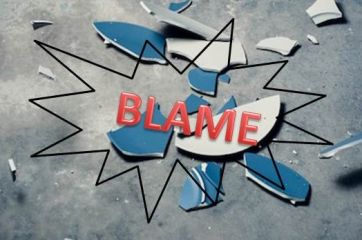
Blame shifting comes easy to us human beings. That began already when we were kids. There was that broken ornament you weren’t supposed to touch – you blamed it on your kid brother. Or that time your Dad asked you why the paint was spilt in the garage – you convinced him it was the cat. Blame shifting began already back in the Garden of Eden. God asked Adam why they were hiding. Adam shifted the blame to Eve. God then asked Eve. She shifted the blame to the snake. And, as they say, the snake didn’t have a leg to stand on – but then, neither did Adam and Eve… they were just passing the buck. And we’ve all been pretty good at it ever since.
Our society doesn’t make it easier because it has made blame shifting quite respectable.
British entertainer, Anna Russell, already made fun of that many decades ago in her “Psychiatric Folksong”:
I went to my psychiatrist to be psychoanalysed,
to find our why I killed the cat, and blackened my wife’s eyes.
He put me on a downy couch to see what he could find,
and this is what he dredged up from my subconscious mind.
When I was one, my mummy hid my dolly in the trunk.
And so it follows naturally that I am always drunk.
When I was two I saw my father kiss the maid one day
And that is why I suffer now from kleptomania.
When I was three, I suffered from ambivalence towards my brothers.
So it follows naturally… I poisoned all my lovers.
I’m so glad that I have learned that lesson it has taught,
that everything I do that’s wrong is someone else’s fault.
Blame shifting has created major problems for our western society.
Before they put up warning signs on Pokies a West Australian man sued the government, some hotels and a company making poker machines. This chronic gambler had gone broke because of his gambling debts. He argued that the government and the hotels should have warned him. And the poker machine company should have had signs up: gambling is addictive. He was not prepared to accept blame. (Nor did he recognise gambling as a voluntary tax on those who are not good at maths.)
In America a murderer was arrested by police. The murderer was armed with knives and handguns. So the police used a police dog to subdue him. After his arrest, the murderer sued the County for use of excessive force in his arrest. It seems that in the skirmish the police dog mangled his foot. The extraordinary thing is that the murderer won a $412,500 settlement. His attorney said this would help ease his client’s re-entry into society on his release from prison.
We live in a society that loves to shift the blame. Or in terms of Anna Russell’s Psychiatric Folksong: we prefer to play the victim. So what do we do then with the stuff we carry around with us? Well of course we look for scapegoats… something to let us off the hook… something that makes us look better and feel better. We’re not really to blame – it’s our circumstances… our upbringing… the pressures of society.
The problem is that playing the victim or looking for scapegoats doesn’t cut it with God. He expects us to come clean. The Bible calls that: confession and repentance. And the good news is that because of the gospel it brings relief to our guilty conscience.
The good news is that Jesus dealt with our guilt on the cross of Calvary. During his crucifixion there were three hours of supernatural darkness… and in that darkness Jesus cried out: My God, my God, why have you abandoned me? We know this darkness was supernatural. It was not a solar eclipse because it was Passover and Passover was linked to the full moon. It was God withdrawing the light of the sun. And God did that to show visibly that He had withdrawn from the Lord Jesus Christ. It was because at that point Jesus was our substitute – taking our guilt… our blame upon himself so we could be forgiven.
Do you see then how absurd it now is for us to keep carrying the load of our guilt or trying to suppress our guilt by shifting the blame or playing the victim? If you believe Jesus died in your place then you are forgiven. That’s a much better solution than blame shifting or playing the victim.
John Westendorp
